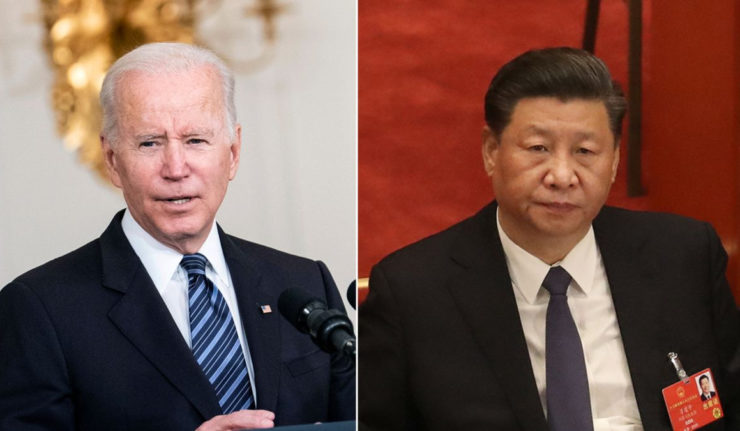Biden’s China outreach: Permanent or just a phase?
13.04.2024
On the 2nd of April, US President Joe Biden had an almost two-hour-long phone call with China’s Xi Jinping, where both leaders discussed the future of US-China ties and issues that underpin it. A bone of contention was restrictions on the transfer of US technologies to China. While Biden argued that restrictions were meant to protect US “national security”, Xi pointed out that restrictions were hurting China’s smooth growth. But despite this clash, a key outcome of the phone call was Washington’s announcement that the US Treasury Secretary Janet Yellen will be travelling to China on an extended visit from the 3rd to the 9th of April. At the time of writing this article, Yellen is in China and, as headlines in the US media show, she is “tackling” Beijing. Tackling, in the US parlance, means an aggressive approach to an issue – an approach that does not seem to be necessarily informed by the imperatives of rapprochement.
Therefore, given the fact that the phone call was initiated by Biden rather than Xi, the aggression Yellen has thus far displayed in her ongoing visit defeats the purpose. It surely negates the impression that US-China relations are “stabilizing”, as the Chinese readout of the phone call said.
It is true that there have been no big confrontations in the past few months, such as the Ballon Incident that took place in February 2023, but that’s probably because Washington is too preoccupied with Ukraine and Israel/Gaza. But, at the same time, the fact the US Congress is pursuing a bill to force China to sell TikTok and/or face a ban shows the level of distrust that continues to inform US policymakers. The US is willing to ban TikTok even though the app contributes more than US$24 billion annually to the US economy. TikTok is not an exception; it is the norm. Therefore, when Yellen was asked about imposing further barriers on China in the wake of Beijing’s failure to address US concerns vis-à-vis the flow of “cheap products” to the global market, she did not rule out the possibility.
In practical terms, the US is asking China to stop producing the so-called “cheap products”, which happens to be a major part of China’s economy, or face blockades. That doesn’t seem like an approach driven by rapprochement. Other blockades are already being reinforced.
On March 29, the US revised its chip export rules, which would make it a lot harder for China to buy US technology. The revised rules, which have already become operational, said restrictions on chip shipments to China also apply to laptops equipped with built-in advanced AI chips. This is simply a recipe for more and more turbulence.
A major source of turbulence is the possibility – which China understands very well – of Donald Trump winning the US elections. Donald Trump is someone who began the so-called “trade war” with China, which the Biden administration has steadfastly followed. When he was in office, Trump did more than the trade war. As reports in the Western media show, Trump authorised the Central Intelligence Agency (CIA) to launch a clandestine propaganda campaign on Chinese social media aimed at turning public opinion in China against its government. According to the report, “The CIA team promoted allegations that members of the ruling Communist Party were hiding ill-gotten money overseas and slammed as corrupt and wasteful China’s Belt and Road Initiative, which provides financing for infrastructure projects in the developing world”.
While the Biden administration is not yet known to have launched such political campaigns against China, its overall approach still reinforces – and will continue to reinforce if Biden wins the elections this year – steps to outcompete China. For instance, the reason why the US continues to impose restrictions on China has to do with the Biden administration’s policy of using competition with China to galvanize greater domestic investments. The result has been over US$2 trillion in investments in clean energy technology, infrastructure, semiconductors, and advanced manufacturing through the Inflation Reduction Act, the CHIPS and Science Act, and the Infrastructure Investment and Jobs Act.
Will Biden make any changes to this framework if he wins the elections is highly inconceivable. As reported in the US media, these steps have begun to make positive changes to the US economy. According to one calculation, “the gap in size between the Chinese and American economies (in dollar-adjusted terms) has grown in America’s favour in recent years, after a prolonged period when China was narrowing the gap. In real terms, China reported growth of 5.2 percent in 2023, with its economy growing from 120 trillion yuan to 126 trillion yuan. However, when converted into dollars at market exchange rates, China’s GDP fell from $17.96 trillion to US$17.71 trillion in 2023. In analogous terms, the US economy grew from $21.8 trillion in 2022 to US$22.3 trillion in 2023, marking a growth of 2.5 percent year-over-year”.
If this is the position, there is no real need for the US to change its policy vis-à-vis China. In fact, both Biden and Trump are expected to follow it even more vigorously. That only means forcing China to take steps that protect its interests, which mainly means more tensions. In this context, the Biden-Xi call, or Yellen’s visit, or the upcoming visit of Antony Blinken to China, are unlikely to have a lasting impact on the state of US-China ties.
Salman Rafi Sheikh, research-analyst of International Relations and Pakistan’s foreign and domestic affairs, exclusively for the online magazine “New Eastern Outlook”
https://journal-neo.su/2024/04/13/bidens-china-outreach-permanent-or-just-a-phase/


0 Comments:
Post a Comment
Subscribe to Post Comments [Atom]
<< Home